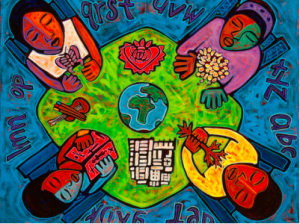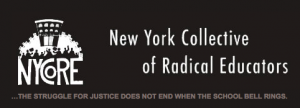Despite small populations of teachers of color there are variety of grassroots organizations seeking to bring these teacher of colors, and white ally teachers, together to act as activists and organizers around achieving educational equity and social justice for their students. While there are some notable local organizations dedicated to activating teachers of color, may of these grassroots organizations provide online networks of teachers of color, and allies, to connect. These grassroots organizations focus on providing professional development, providing resources for culturally-responsive teaching, advocating for curriculum changes, hosting conferences, writing an promoting articles, and creating support systems for teachers of color and allies committed to social justice beyond just schools. Many of these organization have been integral in changing curriculum and pedagogy in their school from caging to social justice -orientated curriculum to integrating ethnic studies programs.These organizations have also began creating huge social media networks that increase conversions about educational equity beyond those directly associated with the field of education. These organizations are facing many of the same challenges, including sustainability (both because of lack of fiscal resources and time for teachers to engage), erasure of the importance of race in schools, and small number of teachers of color. Below is a list of grassroots organizations along with descriptions of their mission and the activist work they engage in.
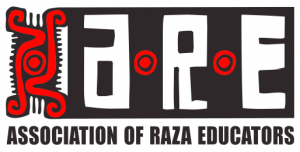
The Association of Raza Educators (A.R.E.) is an organization based out of Los Angeles, Sacramento, and San Diego made of up of primarily Raza* educators as well as students, parents, and community allies focused on using education as a tool for Raza liberation. A.R.E has created its own Ethnic Studies/Social Justice professional development model, hosts an annual statewide conference, raises money to provide scholarships to undocumented students, and organizes around issues ranging from making ethnic studies a requirement to pressuring the Hispanic Scholarship Foundation to helping parents voice their opinions about their students’ schools.
*La Raza is term used to describe communities of Mexicans, Mexican-Americans and sometimes more widely Hispanics and/or Latinx people in America as a group in prideful or endearing terms (Romero, 2016).
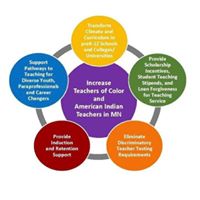 The Coalition to Increase Teachers of Color and American Indian Teachers in Minnesota (TOCAIMN) is grassroots organizations working to address the stark demographic differences between majority white educators in Minnesota and a significant population of students of color and Native Amrican student. The organization is a collective of individuals, organizations, and communities working to increaseand retain teacher son color through their work on glegistaltion, gathering resource, and hosting their annual Conference for Current and Aspiring Teachers of Color and American Indian Teachers.
The Coalition to Increase Teachers of Color and American Indian Teachers in Minnesota (TOCAIMN) is grassroots organizations working to address the stark demographic differences between majority white educators in Minnesota and a significant population of students of color and Native Amrican student. The organization is a collective of individuals, organizations, and communities working to increaseand retain teacher son color through their work on glegistaltion, gathering resource, and hosting their annual Conference for Current and Aspiring Teachers of Color and American Indian Teachers.
The Educators of Colour Network (ECON) is an independent grassroots organization based in Winnipeg, Manitoba, Canada originally founded to support young, Black educators expanded to educators of all cultural background. ECON works to “increase and support diversity in education” and create “more culturally inclusive school environments through providing learning and networking opportunities. Founded by four local educators, ECON is committed to “providing high quality, FREE professional development [to all].

EDUCOLOR is organization designed by educators of color for educators of color who work to increase equity and justice in public education. In addition to hosting monthly Twitter chats, #educolor, EDUCOLOR encourages posting of resources, articles, discussions, and news to their hashtag. EDUCOLOR generates articles, news, and archives of their twitter chats related to issues education and social justice. EDUCOLOR also maintains a list of resources that align with and inform their work to increase equity and justice in public education.
The Institute for Teachers of Color Committed to Racial Justice (ITOC) is an organization based out of California the hosts an annual three-day professional development series designed to support teachers of color who serve primarily students of color. The programing is composed primarily of workshops to help teachers of color and teacher educators of color shift their practices. Examples of workshops from last year’s institute include Re-imagining Discipline: The Importance of Removing Shame From Our Learning Spaces by Michelle Ferrer, Undocumented and Educated: Supporting and Building on the Knowledge of Undocumented Students by Jennifer R. Nájera & Vicente Rodriguez, Critical Teaching: Making the Case for Youth Participatory Action Research in Our Schools by Eddie Lopez, and Black Teacher Affinity & Sustainability by Micia Mosely.
New York Collective of Radical Educators (NYCoRE) is a group of current and former educators dedicated to fighting for social justice in their schools and society. NYCoRE works to raise conscious on inequities in public school, take action around issues of educational justice and broader social justice, build coalition between educational actors, and promote social justice oriented education practice, pedagog, school, and classroom. While not an organization specific only to teachers of color, NYCoRE has a working group with a focus on teachers of color as activists, Educators of Color Group, as part of NyCoRE’s commitment to being maintained by primarily people of color. As a whole NYCoRE’s work includes developing social justice oriented pedagogy and curriculum, holding annual conferences on educational and social justice and organizing, creating space for collaboration between educators.
 The People’s Education Movement (People’s Ed) is a multi-ethnic educator organization based out of South Central Los Angeles devoted to decolonization of educating, social justice, and community building. People’s Ed centers developing decolonized pedagogy that supported marginalized people, participating in political campaigns, organizing , and community forms, holding space for dialogue, holding space for wellness and community gathering, and holding a summer freedom school.
The People’s Education Movement (People’s Ed) is a multi-ethnic educator organization based out of South Central Los Angeles devoted to decolonization of educating, social justice, and community building. People’s Ed centers developing decolonized pedagogy that supported marginalized people, participating in political campaigns, organizing , and community forms, holding space for dialogue, holding space for wellness and community gathering, and holding a summer freedom school.
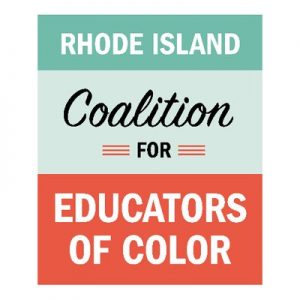 The Rhode Island Coalition of Educators of Color is a grassroots coalition, founded by a small group of urban educators, that “aspires to create a collaborative network for educators. [They] are committed to empowering individuals to build and bridge connection, disrupt racism, and challenge inequities. This year RICEC hosted their first conference on Empowering Educators of Color. While the coalition is a young organization it maintains an active social media presence through Facebook, Twitter, and their hashtag #ricerec.
The Rhode Island Coalition of Educators of Color is a grassroots coalition, founded by a small group of urban educators, that “aspires to create a collaborative network for educators. [They] are committed to empowering individuals to build and bridge connection, disrupt racism, and challenge inequities. This year RICEC hosted their first conference on Empowering Educators of Color. While the coalition is a young organization it maintains an active social media presence through Facebook, Twitter, and their hashtag #ricerec.
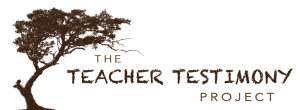 The Teacher Testimony Project is a grassroots organization started from a grant from the AERA Education Service Project Grant to amplify the voices of teachers of color through online testimonial and writing focused on the assets of teacher, students , and their communities. The Teacher Testimony Project’s goal is to document and prominently feature social-justice oriented teachers of color, participate in resource mapping, challenge negative perception of teachers of color, and creating a communal network and support system. Currently the site is featuring testimonials from teachers of color a part of GYO-Illinois– Teachers of Color.
The Teacher Testimony Project is a grassroots organization started from a grant from the AERA Education Service Project Grant to amplify the voices of teachers of color through online testimonial and writing focused on the assets of teacher, students , and their communities. The Teacher Testimony Project’s goal is to document and prominently feature social-justice oriented teachers of color, participate in resource mapping, challenge negative perception of teachers of color, and creating a communal network and support system. Currently the site is featuring testimonials from teachers of color a part of GYO-Illinois– Teachers of Color.
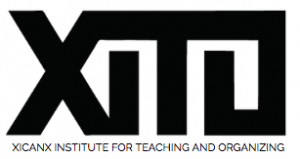 The Xicanx Institute for Teaching and Organizing (XITO) is an urban education consulting collective focused on providing support to Xicanx and Latinx commute by providing teacher with the knowledge to have more culturally- responsive pedagogy. Through teacher prep, social justice -oriented pedagogy,a d community organizing seeks to “fill a gap in Xicanx/Latinx schooling for students and practitioners with goal of impacting future education policy. In addition to hosting institutes as a part of their consulting work XITO provides racial justice and diversity training, teacher training workshops, curriculum development, and assistance with school or district ethnic studies integration.
The Xicanx Institute for Teaching and Organizing (XITO) is an urban education consulting collective focused on providing support to Xicanx and Latinx commute by providing teacher with the knowledge to have more culturally- responsive pedagogy. Through teacher prep, social justice -oriented pedagogy,a d community organizing seeks to “fill a gap in Xicanx/Latinx schooling for students and practitioners with goal of impacting future education policy. In addition to hosting institutes as a part of their consulting work XITO provides racial justice and diversity training, teacher training workshops, curriculum development, and assistance with school or district ethnic studies integration.

